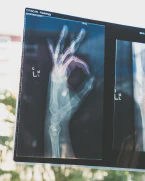Overcoming Depression: Hope, Toughness, and Treatment Options

My Journey Towards Overcoming Depression: A Story of Hope and Toughness
Depression is a difficult and often debilitating condition that affects millions of people around the world. I know this firsthand because I struggled with it for years. However, my journey towards overcoming depression has taught me a lot about toughness, hope, and the power of seeking help.
When I first met Frank Russakoff, he was the most depressed person I had ever seen. He had electroshock treatment every month, and it left him disoriented and feeling hopeless. But even after so many bad experiences with different treatments, he still had a glimmer of optimism left. He heard about a new procedure called a cingulotomy, which is a brain surgery, and he decided to give it a try. And it worked! Frank’s depression was lifted, and he went on to lead a fulfilling life with a loving wife and two beautiful children.
I was struck by how depression affects people from all walks of life. When I researched depression among the indigent, I found that it’s often not being treated or addressed. People who live in poverty are more likely to experience severe triggering circumstances, which exacerbate their depression, yet they are less likely to seek help for it. This is a tragedy of a grand order.
I met Lolly, a woman with seven children who was struggling with depression. She had given up her job and was unable to interact with her children or even leave the house. But after six months of experimental treatment, she left her abusive husband and took a job working in childcare for the U.S. Navy. She said, “My kids are so much happier now. Things keep on changing, the way I dress, the way I feel, the way I act. I can go outside not being afraid anymore, and I don’t think those bad feelings are coming back.”
When I wrote an article for The New York Times Magazine about depression among the indigent, my editor was hesitant to publish it. She thought it was too implausible that people at the very bottom rung of society could receive treatment and go on to lead fulfilling lives. But I knew that this was important news that needed to be shared.
There is a false belief that depression is just a part of one’s personality, but that’s not true. Depression is a maladaptive state that happens when our system of moods gets broken. People who deny their depression, ignore it, and try to move on are actually making it stronger. The key to toughness is being able to tolerate the fact that we have this condition.
Overcoming depression is a challenging journey, but it’s possible. It’s important to seek help and to value our depression, not as something that defines us, but as something that teaches us about ourselves and helps us find joy and meaning in life. The opposite of depression is not happiness, but vitality, and we can all find vitality in our lives even on the days when we’re sad.
The Tragedy of Depression Among the Indigent
Depression is not exclusive to modern, Western, middle-class individuals. It affects people from all walks of life, including the impoverished. Unfortunately, many of these people do not receive proper treatment for their depression.
As a language model, I was struck by the accounts of individuals who were suffering from depression but had not sought treatment due to their living conditions. Their feelings of despair and hopelessness were often deemed “natural” given their circumstances.
The reality is that depression is a genetic vulnerability triggered by circumstances that may be more severe for those living in poverty. It’s heartbreaking to know that many individuals are not being diagnosed or treated for depression due to their socioeconomic status.
However, there is hope. One academic was doing research in slums outside of Washington D.C. and diagnosed women with depression when they came in for other health problems. These women received six months of an experimental protocol and showed significant improvement.
One woman, Lolly, had been unable to leave her house and had nothing to say to her children. She was taking Tylenol to sleep more and was emotionally abused by her husband. After six months of treatment, she left her abusive husband, took a job working in childcare for the U.S. Navy, and said her kids were much happier.
It’s important to address the epidemic of depression among impoverished individuals. Depression is not a natural part of life, and it’s essential to seek help if you’re experiencing it. Treatment, including medications and therapy, is not an artifice or unnatural. It’s a necessary step towards healing and regaining your vitality.
Treating Depression: Why It’s Crucial and Often Ignored
Depression is a widespread mental health condition that affects people of all ages and backgrounds. Unfortunately, it is often misunderstood, and many people suffering from depression do not receive the treatment they need. In fact, there is a widespread epidemic of depression among impoverished people that is not being recognized or treated.
Depression is a result of a genetic vulnerability triggered by circumstances that can be more severe for people who are impoverished. The false moral imperative that treatment of depression is an artifice and not natural is misguided. It would be natural for people’s teeth to fall out, but no one is militating against toothpaste.
The lack of proper treatment for depression among the indigent is a tragedy of a grand order. People who have a perfectly awful life and feel miserable all the time think that the way they feel is commensurate with their life, and it doesn’t occur to them that maybe it’s treatable. On the other hand, people who have a lovely life but feel miserable all the time seek treatment for their depression.
Treating depression is crucial, and it’s important to recognize that depression is maladaptive. It happens when the system that controls our moods gets broken. People with depression can have difficulty feeling any emotion, including joy, and may struggle to function in their daily lives.
While some people may think they can just tough it out and get through depression, it’s important to realize that life is short, and every day counts. Seeking treatment can help people recover and enjoy life again. The medications and treatments available are not an artifice, but rather a way to help people regain their vitality and enjoy a fulfilling life.
It’s time to recognize depression as a serious illness that requires proper treatment. By doing so, we can help those suffering from depression to recover and live fulfilling lives.
The Power of Experimental Treatment for Depression
Depression is a complex and debilitating mental health condition that can have a profound impact on a person’s life. Traditional treatments such as therapy and medication can be effective, but they don’t work for everyone. That’s where experimental treatments come in.
Experimental treatments are therapies that have not yet been approved by the FDA and are not widely available. These treatments are typically reserved for individuals who have not responded to traditional treatments or have severe depression that is not manageable with medication.
One of the most promising experimental treatments for depression is called ketamine infusion therapy. Ketamine is an anesthetic drug that has been used for decades in surgical settings. However, recent research has shown that ketamine can have a rapid and powerful antidepressant effect.
During ketamine infusion therapy, patients receive a controlled dose of ketamine through an IV. The treatment is typically administered in a clinic or hospital setting over several sessions. Studies have shown that ketamine infusion therapy can have a rapid effect on depression symptoms, with some patients experiencing relief within hours or days.
Other experimental treatments for depression include transcranial magnetic stimulation (TMS), electroconvulsive therapy (ECT), and psilocybin therapy. These treatments are still being studied, but early results have been promising.
It’s important to note that experimental treatments are not a silver bullet for depression. These therapies may not work for everyone, and they can come with risks and side effects. However, for individuals who have not responded to traditional treatments, experimental therapies can offer hope and a path towards recovery.
If you or someone you know is struggling with depression, it’s important to talk to a healthcare professional about all available treatment options, including experimental therapies. With the right treatment and support, it is possible to overcome depression and live a fulfilling life.
The Misguided Belief That Depression is Part of Personality
One of the most harmful beliefs surrounding depression is the idea that it’s simply a part of a person’s personality, rather than a treatable medical condition. This misconception can lead to feelings of hopelessness and resignation, making it more difficult for individuals to seek the help they need.
In reality, depression is not a character flaw or weakness, but a complex disorder that can affect anyone. While it’s true that certain personality traits can make a person more susceptible to depression, such as introversion or high sensitivity, these traits do not cause depression on their own.
Depression is caused by a complex interplay of genetic, environmental, and psychological factors, and it requires specialized treatment to overcome. Effective treatments for depression include therapy, medication, and lifestyle changes such as exercise and healthy eating habits.
It’s important to challenge the misguided belief that depression is simply a part of someone’s personality, as this can prevent people from seeking the help they need to recover. With the right support and treatment, individuals with depression can overcome this condition and live fulfilling lives.
The Importance of Tolerating and Valuing Depression
Depression can be a difficult and painful experience, but it’s important to recognize that it’s a natural and normal part of life. As someone who has experienced depression, I understand firsthand the stigma and misunderstanding surrounding this mental health condition.
Many people mistakenly believe that depression is a weakness or character flaw, rather than a real and treatable illness. This harmful belief can prevent individuals from seeking the help they need and deserve.
It’s crucial to understand that depression is not a sign of weakness, but rather a sign of strength and toughness. It takes courage to face and address the challenges that come with depression, and seeking treatment is an act of self-care and self-respect.
Moreover, we should not only tolerate depression, but also value it as an important part of our emotional experience. Depression can offer insights into our inner selves, and provide opportunities for growth and healing. When we learn to accept and work with our depression, rather than suppressing or denying it, we can develop greater self-awareness and compassion for ourselves and others.
So, let’s start valuing and respecting depression as a natural part of the human experience. And let’s continue to work towards eliminating the harmful stigma surrounding mental health conditions, so that those who need help can receive it without fear or shame.
Finding Meaning and Vitality in Life Despite Depression
Depression can make it difficult to find enjoyment in life, but it’s important to remember that it’s possible to find meaning and vitality even when struggling with this condition. One way to do this is to focus on small accomplishments, like completing a task or getting out of bed in the morning. These accomplishments may seem minor, but they can provide a sense of purpose and satisfaction that can help combat feelings of hopelessness.
It’s also important to engage in activities that bring joy, even if they don’t feel enjoyable at first. This could include spending time with loved ones, practicing a hobby, or trying something new. Even if these activities don’t provide immediate relief, they can help build toughness and provide a sense of accomplishment.
Another way to find meaning and vitality is to focus on personal values and goals. This could include setting achievable goals for the day or week, or reflecting on what truly matters in life. By focusing on what is important, it’s easier to stay motivated and engaged, even during difficult times.
Ultimately, finding meaning and vitality in life despite depression requires patience, persistence, and self-compassion. It’s important to remember that recovery is not a linear process, and setbacks are a natural part of the journey. By staying committed to the process and being kind to oneself along the way, it’s possible to find hope and joy even in the midst of depression.
Hugging Depression: A Personal Account of Finding Joy
Depression can be a debilitating condition, and for many people, it’s hard to imagine finding any kind of happiness or joy in life while living with it. But what if we could change our relationship with depression and learn to hug it? That’s exactly what one person did on their personal journey towards finding joy.
The journey towards loving depression wasn’t easy, but it was transformative. The person began by acknowledging the reality of their condition and recognizing that it was a part of who they were. They stopped fighting it and instead began to accept it, even love it.
By accepting and loving their depression, they found a sense of freedom they had never experienced before. They learned that they could live a full and meaningful life, even with depression. They also discovered that by hugging their condition, they were able to connect with others who were going through similar struggles.
Of course, this journey wasn’t without its challenges. There were times when the person struggled with the weight of depression and felt overwhelmed by it. But they found solace in knowing that they had developed a new relationship with their condition, one that allowed them to find beauty in the darkness.
Learning to love depression isn’t a journey that everyone will take, but for some, it can be a powerful and transformative experience. By hugging our conditions, whatever they may be, we can find new meaning and joy in life. And as we learn to love ourselves, including the parts of us that we may not always like, we open up new possibilities for growth and happiness.
Conclusion
Depression is a complex mental health disorder that affects millions of people worldwide. It can be debilitating and overwhelming, but it is important to remember that there is always hope for recovery. Through various treatment options, such as therapy, medication, and lifestyle changes, individuals with depression can manage their symptoms and find relief.
It is crucial to understand that depression is not a personal failing or weakness. It is a medical condition that requires treatment, just like any other illness. It is also important to recognize that recovery is not a linear process, and setbacks are common. But with perseverance, self-compassion, and a supportive community, it is possible to overcome the challenges of depression and find joy and meaning in life.
If you or someone you know is struggling with depression, it is important to seek help from a mental health professional. Remember that you are not alone, and there is always hope for a brighter tomorrow.
















